by Lisa Cooke | Sep 2, 2018
PC: Subscribe in iTunes
1. Copy the following address
itpc://lisalouisecooke.com/Premium_Feed/feed.xml
2. Open iTunes
3. From the menu select FILE and then SUBSCRIBE TO PODCAST
4. Paste the address into the box and click OK
5. You will be prompted to enter your Premium membership username (not your email address) and password
6. The feed will launch in your Podcast Library and the most current episode will download. You may be prompted a second time to enter your username and password in order to download episodes.
7. Click the GET ALL button to download all of the available episodes.
by Lisa Cooke | Nov 18, 2017 | 01 What's New, Professional Genealogy, Societies
A professional genealogist can help you apply to lineage societies. Joining is a time-honored way to honor your heritage and document your family history research. But it’s not easy! Here’s why even experienced genealogists may want to hire a professional to help with the process.

Thanks to Legacy Tree Genealogists for supplying this guest blog post.
Applying to lineage societies
Do you have an ancestor who lived in Colonial America when the Revolutionary War was fought, or perhaps earlier in Jamestown, Virginia? Does your ancestry extend back to New England when the Mayflower arrived? If so, there are various lineage societies you could consider joining:
 While each organization has different requirements for their lineage society application, most have the same principles: prove a connection from yourself to the person of interest by use of vital records (where available). Where not available, other documentation that proves family connections can be used. (DAR now also accepts DNA evidence.)
While each organization has different requirements for their lineage society application, most have the same principles: prove a connection from yourself to the person of interest by use of vital records (where available). Where not available, other documentation that proves family connections can be used. (DAR now also accepts DNA evidence.)
You may not know that most societies allow you to “piggy-back” on applications they have previously accepted. Let’s say your second cousin Steve already joined a society based on your common patriot (or pioneer) ancestor, Alexander Smith. You would just need to provide documentation proving your connection to your parents, your relevant parent’s connection to his/her parents, and your relevant grandparent’s connection to your common great-grandparents, who were already mentioned in Steve’s application. You may then be able to reference Steve’s application for the remainder of the lineage going back to Alexander Smith.
Overall, this may sound like a simple process. But it often takes quite a bit of work because the records needed to prove each generational link are not always readily available–and sometimes they just don’t exist at all.
Why get help when applying to lineage societies
Below are five ways that a professional genealogist can help you apply to lineage societies:
1. Help you determine how to apply. As we mentioned, each lineage society has different requirements, so you’ll want to be sure you know what they expect in order to be as efficient as possible in gathering documentation. A professional can help you determine exactly what documentation is required and locate contact information for those with whom you need to work to submit your application.
2. Identify where your research should stop and start. There is no need to reinvent the wheel, as the saying goes. If your lineage ties into one that has already been acceptably documented by another member of the society, you should use it! A professional genealogist can help you identify any previous lineage society applications that have already been approved for your lineage. This single step can save you a lot of time and money.
3. Organize your information. A professional genealogist can work with you to determine what documentation you already have and what you will need to order. They can help you order copies of missing vital records or find acceptable substitutes in archives, libraries, and online.
 4. Conduct in-depth research as needed. Many times, at least one ‘problem’ generation requires in-depth research, circumstantial evidence, and a proof summary in order to make the connection. A well-written proof summary explains how all the circumstantial evidence fits together to support the generational link, and often aids the applicant in obtaining membership when not enough concrete documentation is available (or when it conflicts). This often involves delving into land records, tax lists, probate records, and other more obscure sources to find any and all clues and pieces of information that can be used to tie two generations together. It can be a time-consuming task. A professional genealogist can do this efficiently and thoroughly.
4. Conduct in-depth research as needed. Many times, at least one ‘problem’ generation requires in-depth research, circumstantial evidence, and a proof summary in order to make the connection. A well-written proof summary explains how all the circumstantial evidence fits together to support the generational link, and often aids the applicant in obtaining membership when not enough concrete documentation is available (or when it conflicts). This often involves delving into land records, tax lists, probate records, and other more obscure sources to find any and all clues and pieces of information that can be used to tie two generations together. It can be a time-consuming task. A professional genealogist can do this efficiently and thoroughly.
5. Compile and present all records to the lineage society for admittance. You’ll be the one to present or submit your documentation, but professionals can help you get it all ready so that you’ll be as prepared and organized as possible.
Save time and money when applying to lineage societies
A well-prepared lineage society application often shortens the waiting period to be accepted into a society because it is easier to verify and follows the rules of the society. If an application is poorly prepared, it can take several submissions before acceptance into the society is granted. And of course, the lineage society determines what they will and will not accept as proof, so there’s never a guarantee. They may request additional information, and then you have to go back and keep digging! But since professional genealogists have experience working with the various societies and know what types of documentation are usually accepted, working with a pro can make the application process to a lineage easier, more efficient, and in the end, more rewarding.
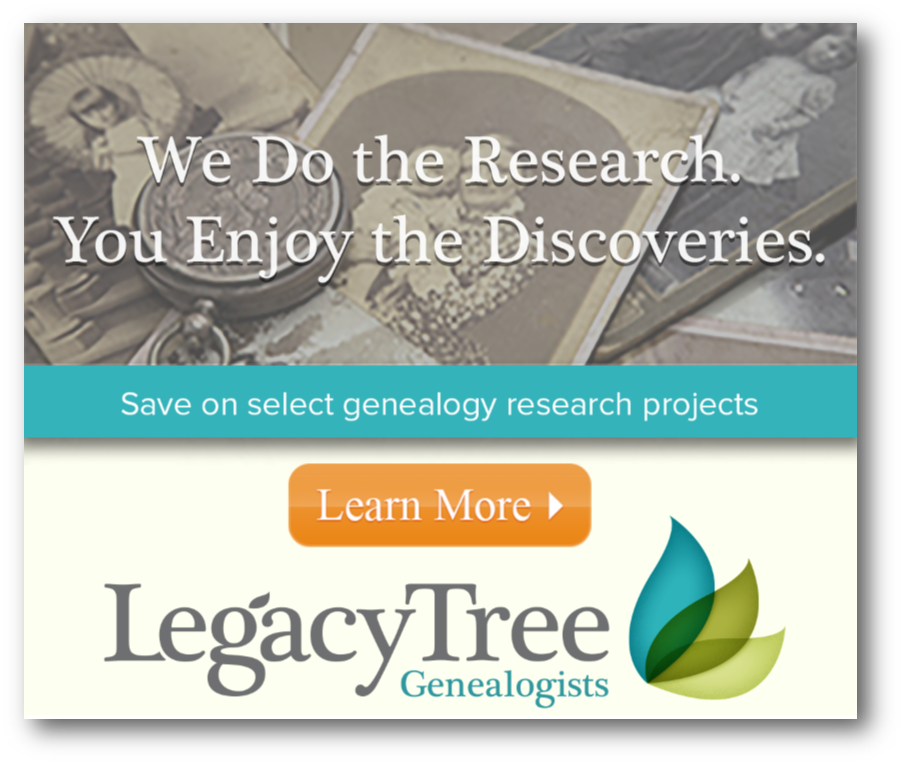 If you have an ancestor in your lineage who may qualify you to join a lineage society, experts at Legacy Tree Genealogists can help you gather your documentation and prepare your application. They are the world’s highest client-rated genealogy research firm. Founded in 2004, the company provides full-service genealogical research for clients worldwide, helping them discover their roots and personal history through records, narratives, and DNA. Based near the world’s largest family history library in downtown Salt Lake City, Utah, Legacy Tree has developed a network of professional researchers and archives around the globe.
If you have an ancestor in your lineage who may qualify you to join a lineage society, experts at Legacy Tree Genealogists can help you gather your documentation and prepare your application. They are the world’s highest client-rated genealogy research firm. Founded in 2004, the company provides full-service genealogical research for clients worldwide, helping them discover their roots and personal history through records, narratives, and DNA. Based near the world’s largest family history library in downtown Salt Lake City, Utah, Legacy Tree has developed a network of professional researchers and archives around the globe.
Contact them today to discuss your options–and your ancestors. EXCLUSIVE OFFER for Genealogy Gems readers! Receive $100 off a 20-hour+ research project from Legacy Tree Genealogists with code GEMS100. Offer good through December 31, 2017.
by Lisa Cooke | Nov 3, 2017 | 01 What's New, British, Canadian, Newspaper, Records & databases, United States
Historic U.S. newspapers are featured in this week’s new and updated records collections, including Hawaii, Colorado, Georgia, and North Carolina. Also new this week are updated New York passenger lists, vital records for England, Welsh newspapers, military and census records for Canada, and Austrian parish records.

Historic U.S. Newspapers & More
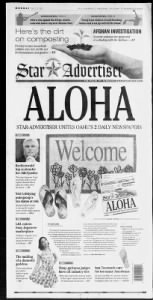
This week we were delighted to see lots of historic U.S. newspaper made available online. Newspapers are a fantastic way to find clues about your ancestors, especially when vital records are elusive, and also learn about their daily lives.
Hawaii. If you have family from Hawaii or are interested in Hawaiian history, then you’ll definitely want to check out these three new titles added to Newspapers.com:
In 2010, the Adviser and Star-Bulletin were merged to create the Honolulu Star-Advertiser. If you’re looking for ancestors or other family members in these papers, good places to start include personals columns, society pages, local interest columns, and the like.
Colorado. History Colorado (HC) recently digitized and added two historic Denver African-American newspapers: Statesman (1905-1912), and The Denver Star (1912-1918). While these papers covered news from African-American communities in “Colorado, Wyoming, Montana and the West,” they also covered local news from Denver’s Five Points district. These newspapers cover Denver’s African American culture and community, including its residents, businesses, and aspects of everyday life.
Georgia. Georgia Perimeter College Collection is now available online. The digital collection includes yearbooks, catalogs, and student newspapers from the 1960s to the 2010s. You can browse the collection by decade, date, format, or by the name of the institution at the time each item was published.
North Carolina. The newspaper of Belmont Abbey College in Belmont, NC has been digitized and made available online. There are 44 issues are available to browse spanning from 1971-1979 with issues published every other month. Among the news headlines are graduations, alumni news, fundraising campaigns, appointments of new abbots, and changes on campus reflective of this decade’s larger cultural movements.
New York. MyHeritage has updated their collection of Ellis Island and Other New York Passenger Lists, 1820-1957. This collection contains millions of records of individuals arriving at the port of New York, including individuals who arrived at three well-known immigrant processing stations: Castle Garden (1855-1890), the Barge Office (1890-1892), and Ellis Island (1892-1957).
England – Portsmouth Collection
Findmypast has an exciting new collection for Portsmouth, Hampshire. This collection of scanned images of original handwritten documents contains more than 1.3 million historical records spanning 1538 – 1917. When complete, the collection will be the largest repository of Portsmouth family history records available online. Click the links below to explore the 5 collections:
Also new this week from The British Newspaper Archive is the Ross Gazette. This newspaper is published by Tindle Newspapers in Ross-on-Wye, Herefordshire, England, spanning 1867 – 1910. This collection currently has over 2,000 issues available now, with more continuing to be added.
Welsh Newspapers
 Even more historic newspapers are new this week as we head over to Wales. The British Newspaper Archive recently added the Rhyl Journal (Clywd, 1877 – 1897) and Cambrian News (Dyfed, 1863 – 1882) to their database.
Even more historic newspapers are new this week as we head over to Wales. The British Newspaper Archive recently added the Rhyl Journal (Clywd, 1877 – 1897) and Cambrian News (Dyfed, 1863 – 1882) to their database.
Though these collections are relatively small, they can provide wonderful clues and details about your ancestors living in Wales in the 19th century.
Canada – Military and Census Records
New for Canada this week are Certificates of Military Instruction at Fold3, which includes records from 1867 to 1932. There were initially two types of certificates: First Class (battalion-level officers) and Second Class (company-level officers). The information you can find in the certificates in this collection typically includes the man’s name, rank, and residence; the certificate type and date; and the name and location of the school.
The 1921 Canadian Census is now available for free at the Library and Archives Canada. The 1921 Census marked the sixth regularly scheduled collection of national statistics. It officially began on June 1, 1921. This research tool contains 8,800,617 records that are searchable by name.
Austria – Parish Records
Over at Ancestry.com, a new collection of Salzburg Catholic Baptisms, Marriages, and Burials, 1600-1930 is now available. From the description: “This collection contains parish registers from numerous Catholic communities in the city Salzburg, Austria as well as numerous communities that today are part of the Austrian state of Salzburg.” Note that these records are in German, and you should search using German words and location spellings.
Native American Records
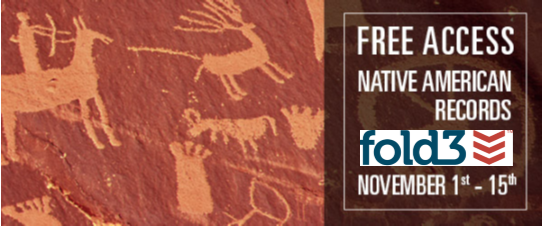 Do you have Native American ancestry? Or are you interested in Native American history? Then explore Fold3’s Native American Collection for free November 1-15, 2017. Their unique collection includes records, documents, and photos never before seen online. All you need is a free Fold3 account to start exploring!
Do you have Native American ancestry? Or are you interested in Native American history? Then explore Fold3’s Native American Collection for free November 1-15, 2017. Their unique collection includes records, documents, and photos never before seen online. All you need is a free Fold3 account to start exploring!
Disclosure: This page contains affiliate links and Genealogy Gems will be compensated if you make a purchase after clicking on these links (at no additional cost to you). Thank you for supporting this free podcast and blog!
by Lisa Cooke | Jun 24, 2017 | 01 What's New, Jewish, Newspaper, Volunteer
Looking for an easy way to make a big difference? Help collect Holocaust newspaper articles printed in your local newspapers for the History Unfolded project of the United States Holocaust Memorial Museum. Do it on your own, or with your local genealogical or historical society!
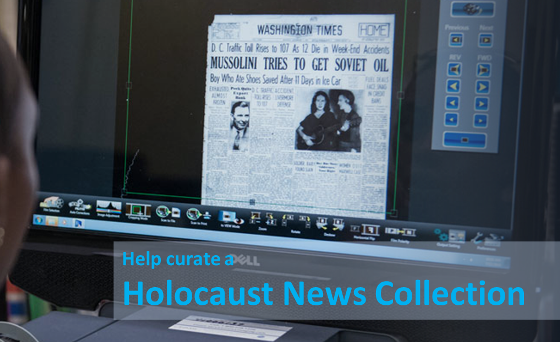
The following article came to us via Newspapers.com:
What is History Unfolded? History Unfolded is a project that seeks to expand our knowledge of how American newspapers reported on Nazi persecution during the 1930s and ’40s so we can better understand what Americans knew about the Holocaust as it was happening.
To help achieve this, the History Unfolded project asks people like you to search local newspapers from the 1930s and ’40s for Holocaust-related news and opinions and then submit them online to the museum. The newspaper articles you submit will be used to help shape the museum’s 2018 exhibit on Americans and the Holocaust and related educational materials. The articles will also be made available to scholars, historians, and the public.
Who Can Contribute? Everyone! History buffs, students, teachers (with) an interest in the Holocaust and access to a newspaper from the 1930s or ’40s, either online (using Newspapers.com, for example) or through a physical archive, such as a library. Simply create an account with History Unfolded (to get started.)
How Do I Contribute? History Unfolded has created a list of more than 30 Holocaust-related events to focus on. Choose one of these events to research, then search for content related to that topic in an American newspaper of your choice from the 1930s or ’40s. After you find an article related to one of the events, submit it online to the museum through the project’s website.
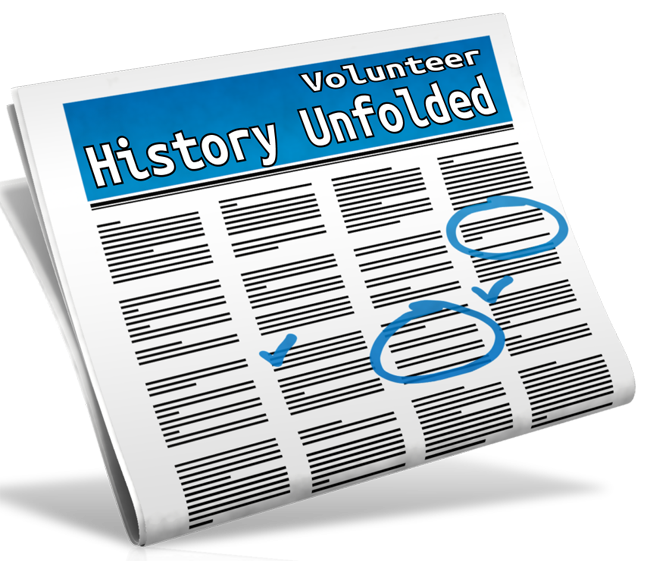 Newspapers.com and History Unfolded You can contribute to this important project whether or not you use Newspapers.com to do so. But using Newspapers.com makes it even easier to submit the articles you find. Simply use Newspapers.com to create a clipping of an article you’ve found, then submit that clipping through the submission form on the History Unfolded website. The submission form has a special tool created specifically for Newspapers.com users that makes submitting your clipping a snap.
Newspapers.com and History Unfolded You can contribute to this important project whether or not you use Newspapers.com to do so. But using Newspapers.com makes it even easier to submit the articles you find. Simply use Newspapers.com to create a clipping of an article you’ve found, then submit that clipping through the submission form on the History Unfolded website. The submission form has a special tool created specifically for Newspapers.com users that makes submitting your clipping a snap.
Your help with this project will help shape our understanding of the Holocaust and the lessons it holds for us today. For more information on how to get involved, visit the History Unfolded website.
Get involved! Click here to read about more ways to volunteer in our global genealogy community. Your efforts make a huge difference.


 While each organization has different requirements for their lineage society application, most have the same principles: prove a connection from yourself to the person of interest by use of vital records (where available). Where not available, other documentation that proves family connections can be used. (DAR now also
While each organization has different requirements for their lineage society application, most have the same principles: prove a connection from yourself to the person of interest by use of vital records (where available). Where not available, other documentation that proves family connections can be used. (DAR now also  4. Conduct in-depth research as needed. Many times, at least one ‘problem’ generation requires in-depth research, circumstantial evidence, and a proof summary in order to make the connection. A well-written proof summary explains how all the circumstantial evidence fits together to support the generational link, and often aids the applicant in obtaining membership when not enough concrete documentation is available (or when it conflicts). This often involves delving into land records, tax lists, probate records, and other more obscure sources to find any and all clues and pieces of information that can be used to tie two generations together. It can be a time-consuming task. A professional genealogist can do this efficiently and thoroughly.
4. Conduct in-depth research as needed. Many times, at least one ‘problem’ generation requires in-depth research, circumstantial evidence, and a proof summary in order to make the connection. A well-written proof summary explains how all the circumstantial evidence fits together to support the generational link, and often aids the applicant in obtaining membership when not enough concrete documentation is available (or when it conflicts). This often involves delving into land records, tax lists, probate records, and other more obscure sources to find any and all clues and pieces of information that can be used to tie two generations together. It can be a time-consuming task. A professional genealogist can do this efficiently and thoroughly.





 Newspapers.com and History Unfolded You can contribute to this important project whether or not you use Newspapers.com to do so. But using Newspapers.com makes it even easier to submit the articles you find. Simply use Newspapers.com to create a clipping of an article you’ve found, then submit that clipping through the
Newspapers.com and History Unfolded You can contribute to this important project whether or not you use Newspapers.com to do so. But using Newspapers.com makes it even easier to submit the articles you find. Simply use Newspapers.com to create a clipping of an article you’ve found, then submit that clipping through the